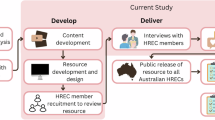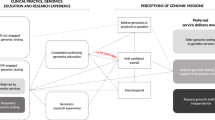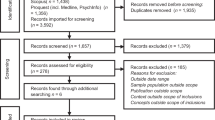Abstract
Human research ethics committees (HRECs) are evaluating increasing quantities of genomic research applications with complex ethical considerations. Genomic confidence is reportedly low amongst many non-genetics-experts; however, no studies have evaluated genomic confidence levels in HREC members specifically. This study used online surveys to explore genomic confidence levels, predictors of confidence, and genomics resource needs of members from 185 HRECs across Australia. Surveys were fully or partially completed by 145 members. All reported having postgraduate 94 (86%) and/or bachelor 15 (14%) degrees. Participants consisted mainly of researchers (n = 45, 33%) and lay members (n = 41, 30%), affiliated with either public health services (n = 73, 51%) or public universities (n = 31, 22%). Over half had served their HREC \(\ge\)3 years. Fifty (44%) reviewed genomic studies \(\le\)3 times annually. Seventy (60%) had undertaken some form of genomic education. While most (94/103, 91%) had high genomic literacy based on familiarity with genomic terms, average genomic confidence scores (GCS) were moderate (5.7/10, n = 119). Simple linear regression showed that GCS was positively associated with years of HREC service, frequency of reviewing genomic applications, undertaking self-reported genomic education, and familiarity with genomic terms (p < 0.05 for all). Conversely, lay members and/or those relying on others when reviewing genomic studies had lower GCSs (p < 0.05 for both). Most members (n = 83, 76%) agreed further resources would be valuable when reviewing genomic research applications, and online courses and printed materials were preferred. In conclusion, even well-educated HREC members familiar with genomic terms lack genomic confidence, which could be enhanced with additional genomic education and/or resources.
This is a preview of subscription content, access via your institution
Access options
Subscribe to this journal
Receive 12 print issues and online access
$259.00 per year
only $21.58 per issue
Buy this article
- Purchase on SpringerLink
- Instant access to the full article PDF.
USD 39.95
Prices may be subject to local taxes which are calculated during checkout
Similar content being viewed by others
Data availability
The datasets generated and/or analysed during the current study are available from the corresponding author on reasonable request.
References
Khan R, Mittelman D. Consumer genomics will change your life, whether you get tested or not. Genome Biol. 2018;19:4–7.
Martinez-martin N, Magnus D, Martinez-martin N, Magnus D. Privacy and ethical challenges in next-generation sequencing Privacy and ethical challenges in next-generation sequencing. Expert Rev Precis Med Drug Dev. 2019;4:95–104.
Barazzetti G, Cavalli S, Benaroyo L, Kaufmann A. Still rather hazy at present: citizens’ and physicians’ views on returning results from Biobank research using broad consent. Genet Test Mol Biomark. 2017;21:159–65.
Budin-Ljøsne I, Teare HJA, Kaye J, Beck S, Bentzen HB, Caenazzo L, et al. Dynamic consent: a potential solution to some of the challenges of modern biomedical research. BMC Med Ethics. 2017;18:1–10.
Mascalzoni D, Hicks A, Pramstaller P, Wjst M. Informed consent in the genomics era. PLoS Med. 2008;5:1302–5.
Johnson SB, Slade I, Giubilini A, Graham M. Rethinking the ethical principles of genomic medicine services. Eur J Hum Genet. 2020;28:147–54.
Kaye J, Boddington P, De Vries J, Hawkins N, Melham K. Ethical implications of use of whole genome methods in medical research. Eur J Hum Genet. 2010;18:398–403.
Eckstein L, Garrett JR, Berkman BE. A framework for analyzing the ethics of disclosing genetic research findings. 2014;42:190–207.
Bombard Y, Brothers KB, Fitzgerald-Butt S, Garrison NA, Jamal L, James CA, et al. The responsibility to recontact research participants after reinterpretation of genetic and genomic research results. Am J Hum Genet. 2019;104:578–95.
Tibben A, Dondorp W, Cornelis C, Knoers N, Brilstra E, van Summeren M, et al. Parents, their children, whole exome sequencing and unsolicited findings: growing towards the child’s future autonomy. Eur J Hum Genet. 2021;29:911–9.
Hart MR, Biesecker BB, Blout CL, Christensen KD, Amendola LM, Bergstrom KL, et al. Secondary findings from clinical genomic sequencing: prevalence, patient perspectives, family history assessment, and health-care costs from a multisite study. Genet Med. 2019;21:1100–10.
Kaye J, Terry SF, Juengst E, Coy S, Harris JR, Chalmers D, et al. Including all voices international datasharing governance. Hum Genom. 2018;12:18–23.
Arbour L, Cook D. DNA on loan: Issues to consider when carrying out genetic research with aboriginal families and communities. Commun Genet. 2006;9:153–60.
Kowal E, Orphan DNA. Indigenous samples, ethical biovalue and postcolonial science. Soc Stud Sci. 2013;43:577–97.
Vidgen ME, Kaladharan S, Malacova E, Hurst C, Waddell N. Sharing genomic data from clinical testing with researchers: public survey of expectations of clinical genomic data management in Queensland, Australia. BMC Med Ethics. 2020;21:1–11.
Liao SM. Is there a duty to share genetic information? J Med Ethics. 2009;35:306–9.
Wallingford CK, Cutler K, Istiko SN, Fowles LF, Lamb R, Bean J, et al. Queensland consumers’ awareness and understanding of clinical genetics services. Front Genet. 2020;11:1–8.
Haga SB, Carrig MM, O’Daniel JM, Orlando LA, Killeya-Jones LA, Ginsburg GS, et al. Genomic risk profiling: attitudes and use in personal and clinical care of primary care physicians. J Gen Intern Med. 2011;26:834–40.
Tiller J, Keogh L, Wake S, Delatycki M, Otlowski M, Lacaze P. Genetics, insurance and professional practice: survey of the Australasian clinical genetics workforce. Front Public Heal. 2018;6:1–7.
Carere DA, Kraft P, Kaphingst KA, Roberts JS, Green RC. Consumers report lower confidence in their genetics knowledge following direct-to-consumer personal genomic testing. Genet Med. 2016;18:65–72.
Hamilton JG, Abdiwahab E, Edwards HM, Fang M, et al. Primary care providers’ cancer genetic testing-related knowledge, attitudes and communication behaviors: a systematic review and research agenda. J Gen Intern Med. 2017;32:315–24.
Chow-White P, Ha D, Laskin J. Knowledge, attitudes, and values among physicians working with clinical genomics: a survey of medical oncologists. Hum Resour Health. 2017;15:1–9.
Papaioannou K, Kampourakis K. Health-care professionals’ awareness and understanding of genomics. In Applied genomics and public health. Cambridge, Massachusetts, Academic Press 2020 (pp. 225–242).
Gingras I, Sonnenblick A, De Azambuja E, Paesmans M, Delaloge S, Aftimos P, et al. The current use and attitudes towards tumor genome sequencing in breast cancer. Sci Rep. 2016;6:1–8.
Blazer KR, Nehoray B, Solomon I, Niell-swiller M, Culver JO, Uman GC, et al. Next-generation testing for cancer risk: perceptions, experiences, and needs among early adopters in community healthcare settings. Genet Test Mol Biomarkers. 2015;19:657–65.
Demeshko A, Pennisi DJ, Narayan S, Gray SW, Brown MA, McInerney-Leo AM. Factors influencing cancer genetic somatic mutation test ordering by cancer physician. J Transl Med. 2020;18:413.
Harding B, Webber C, Rühland L, Dalgarno N, Armour C, Birtwhistle R, et al. Bridging the gap in genetics: a progressive model for primary to specialist care. BMC Med Educ. 2019;19:1–10.
Johnson LM, Valdez JM, Quinn EA, Sykes AD, McGee RB, Nuccio R, et al. Integrating next-generation sequencing into pediatric oncology practice: an assessment of physician confidence and understanding of clinical genomics. Cancer. 2017;123:2352–9.
National Health and Medical Research Council. Report on the Activity of Human Research Ethics Committees and Certified Institutions for the period: 1 January 2019 to 31 December 2019. National Health and Medical Research Council: 2020. Available from https://www.nhmrc.gov.au/about-us/resources/activity-human-research-ethics-committees-and-certified-institutions.
National Health and Medical Research Council. List of Human Research Ethics Committees registered with NHMRC. National Health and Medical Research Council: 2018. Available from: https://www.nhmrc.gov.au/sites/default/files/documents/attachments/registered-hrecs.pdf.
Gliwa C, Yurkiewicz IR, Lehmann LS, Hull SC, Jones N, Berkman BE. Institutional review board perspectives on obligations to disclose genetic incidental findings to research participants. Genet Med. 2016;18:705–11.
Dressler LG, Smolek S, Ponsaran R, Markey JM, Starks H, Gerson N, et al. IRB perspectives on the return of individual results from genomic research. Genet Med. 2012;14:215–22.
De Smit E, Kearns L, Clarke L, Dick J, Hill C, Hewitt A. Heterogeneity of human research ethics committees and research governance offices across Australia: an observational study. Australas Med J. 2016;9:33–9.
Milo Rasouly H, Cuneo N, Marasa M, DeMaria N, Chatterjee D, Thompson JJ, et al. GeneLiFT: a novel test to facilitate rapid screening of genetic literacy in a diverse population undergoing genetic testing. J Genet Couns. 2020;30:742–54.
IBM Corp. Released 2020. IBM SPSS Statistics for Macintosh, Version 27.0. Armonk, NY; IBM Corp.
Calzone KA, Kirk M, Tonkin E, Badzek L, Benjamin C, Middleton A. The global landscape of nursing and genomics. J Nurs Scholarsh. 2018;50:249–56.
Wright CF, FitzPatrick DR, Firth HV. Paediatric genomics: diagnosing rare disease in children. Nat Rev Genet. 2018;19:253–68.
Mcclaren BJ, Crellin E, Janinski M, Nisselle AE. Preparing medical specialists for genomic medicine: continuing education should include opportunities for experiential learning. Front Genet. 2020;11:1–11.
Haga SB, Barry WT, Mills R, Ginsburg GS, Svetkey L, Sullivan J, et al. Public knowledge of and attitudes toward genetics and genetic testing. Genet Test Mol Biomark. 2013;17:327–35.
Whitley KV, Tueller JA, Weber KS. Genomics education in the era of personal genomics: academic, professional, and public considerations. Int J Mol Sci. 2020;21:768.
Savard J, Hickerton C, Tytherleigh R, Terrill B, Turbitt E, Newson AJ, et al. Australians’ views and experience of personal genomic testing: survey findings from the Genioz study. Eur J Hum Genet. 2019;27:711–20.
Rubanovich CK, Cheung C, Mandel J, Bloss CS. Physician preparedness for big genomic data: a review of genomic medicine education initiatives in the United States. Hum Mol Genet. 2018;27:R250–8.
Abrams LR, McBride CM, Hooker GW, Cappella JN, Koehly LM. The many facets of genetic literacy: assessing the scalability of multiple measures for broad use in survey research. PLoS One. 2015;10:1–11.
Acknowledgements
We thank the NHMRC Research Quality and Priorities group for providing contact details for the HREC co-ordinators. We would also like to thank the HREC members who graciously agreed to participate.
Funding
AML is funded by a National Health and Medical Research Council (NHMRC) Early Career Fellowship (ID 1158111). RMW was supported by an ARC Discovery Project (ID 180100269). The University of Queensland Diamantina Institute is located in The Translational Research Institute, supported by a grant from the Australian Government. CW is supported by an Australian Government Research Training Program Scholarship.
Author information
Authors and Affiliations
Contributions
RP, CJ and AML were responsible for study design, and data collection. RP, AML and CW were responsible for data analysis, interpreting results, and writing the manuscript. JB, SBC, LE, RM, BT, and CJ gave input on questionnaire design and edited the manuscript.
Corresponding authors
Ethics declarations
Competing interests
LE has recently received funds from Praxis Australia to develop training materials for HRECs. The other authors declare no competing interests.
Ethics approval
Ethics approval for this study was obtained through the University of Queensland Human Research Ethics Committee (HREC) (UQ #2019002416) and ratified by the University of Technology Sydney HREC (ETH19-C0005).
Additional information
Publisher’s note Springer Nature remains neutral with regard to jurisdictional claims in published maps and institutional affiliations.
Supplementary information
Rights and permissions
About this article
Cite this article
Pysar, R., Wallingford, C.K., Boyle, J. et al. Australian human research ethics committee members’ confidence in reviewing genomic research applications. Eur J Hum Genet 29, 1811–1818 (2021). https://doi.org/10.1038/s41431-021-00951-5
Received:
Revised:
Accepted:
Published:
Version of record:
Issue date:
DOI: https://doi.org/10.1038/s41431-021-00951-5
This article is cited by
-
Empowering human research ethics committees to review genomics applications: evaluating the utility of a custom online education resource
European Journal of Human Genetics (2025)
-
Self-assessed knowledge of genomic medicine among non-genetics physicians – results from a nationwide Swedish survey
Journal of Community Genetics (2025)
-
Genomics elucidates both common and rare disease aetiology
European Journal of Human Genetics (2021)



